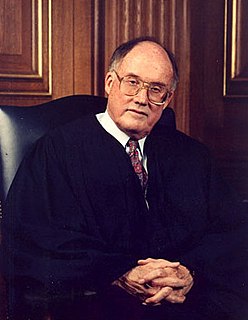Top 20 Quotes & Sayings by William Rehnquist
Explore popular quotes and sayings by an American judge William Rehnquist.
Last updated on April 14, 2025.
At the heart of the First Amendment is the recognition of the fundamental importance of the free flow of ideas and opinions on matters of public interest and concern. The freedom to speak one's mind is not only an aspect of individual liberty - and thus a good unto itself - but also is essential to the common quest for truth and the vitality of society as a whole. We have therefore been particularly vigilant to ensure that individual expressions of ideas remain free from governmentally imposed sanctions.
A father's interest in having a child--perhaps his only child--may be unmatched by any other interest in his life. It is truly surprising that the state must assign a greater value to a mother's decision to cut off a potential human life by abortion than to a father's decision to let it mature into a live child.
It is impossible to build sound constitutional doctrine upon a mistaken understanding of Constitutional history... The establishment clause has been expressly freighted with Jefferson's misleading metaphor for nearly forty years... There is simply no historical foundation for the proposition that the framers intended to build a wall of separation... The recent court decisions are in no way based on either the language or intent of the framers.
What many of those who oppose the use of juries in civil trials seem to ignore is that the founders of our Nation considered the right of trial by jury in civil cases an important bulwark against tyranny and corruption, a safeguard too precious to be left to the whim of the sovereign, or, it might be added, to that of the judiciary.


















